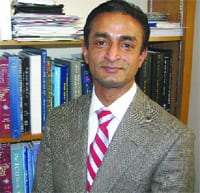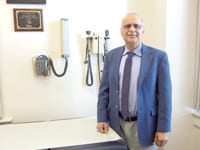Heart of the Matter ‘Changing Lives’ Is the Simple Job Description for This Interventional Cardiologist
Dr. Ashequl Islam remembers his work in surgery during his internship at Dhaka Medical College in his homeland of Bangladesh, and especially the satisfaction he took from it.
“I started with the surgical rotation and just loved it,” he recalled. “I liked working with my hands and trying to fix things. That’s when I thought to myself, ‘I’m going to be a surgeon.’”
Nearly 20 years later, Islam is still fixing things, and on a number of levels, through his work in interventional cardiology and vascular medicine and intervention at Baystate Cardiology. Some days he’s in surgery, inserting stents, performing angioplasty, and handling other procedures. Other days, he’s conducting clinical work and advising patients, usually about the need to craft a healthier lifestyle be it though kicking the smoking habit, getting more exercise, or changing one’s diet.
In all cases, he says his work boils down to changing people’s lives — or at least trying to. Indeed, there is often frustration that comes amid discussions with people who are unable or unwilling to quit smoking or who struggle to stay with a healthier diet, but very often some victories, large and small, that will make Islam’s day.
“In the middle of the day, I may have five frustrating moments, and then one stimulation that keeps me going,” he said, citing, as just one example, a patient who is finally able to kick the nicotine habit. “That’s why I consider myself fortunate to be in this field; you’re working with people, you’re talking to them, and, many times, you’re changing their life for the better.”
And while changing lives, Islam is also an enthusiastic participant in a broad, ongoing sea change in the ways cardiac and vascular care are administered — the centerpiece of the new Vascular Center that will be the dominant feature of Baystate’s new Hospital of the Future.
“It’s much more than a building,” he said, echoing the comments of other Baystate physicians quoted in this space. “It’s really about streamlining the care we provide and reducing or eliminating duplication of efforts. We’ve been practicing in silos for a long time now, and adding a lot of extra expenses. But there’s been a blurring of the boundaries, and everyone benefits.”
In this, the latest installment of The Healthcare News’ Physician Profile series, we talk with Islam about cardiac care, tearing down those silos, and also how he’s taken a long road, literally and figuratively, from his native Bangladesh to his office at Baystate Medical Center.
World of Difference
In Bangladeshi culture, parents have significant influence on their children, said Islam, noting that his father, who worked for many years in the country’s so-called Ministry of Food, had always wanted his son to become a doctor.
“He always thought it was the most noble profession, and that’s what he wanted for me,” Islam explained, noting that, although he wasn’t “100{06cf2b9696b159f874511d23dbc893eb1ac83014175ed30550cfff22781411e5} motivated” to be a doctor, he nonetheless applied to most of the eight medical schools in the country and was eventually accepted into Dhaka Medical College, the oldest and most prestigious of the institutions.
After five years there (one goes right from high school to medical school in Bangladesh), he went on to a one-year internship at Dhaka Medical School Hospital, an experience that really opened his eyes to the profession and its many different kinds of rewards. “The opportunities were endless,” he explained. “You’d see everything there and get involved in lot of procedures; it was an incredible experience.”
And it brought Islam to a critical crossroads in his career.
He was trying to decide between starting work in medicine or traveling overseas to continue his education. “And that’s when I told my father, ‘I think I’m going to go to America,’” Islam recalled, noting that this plan was met with some skepticism and the question, ‘are you sure?’ asked repeatedly. “I told him I wanted to see the best and learn in the mecca of medicine.”
So Islam applied to several schools offering health care-related degree programs, and eventually decided to eschew offers from Columbia, the University of Texas, and other schools, and attend UMass Amherst and its School of Public Health, which promised a tuition waiver. He remembers arriving at New York’s JFK Airport in August 1993 and immediately concluding that the U.S. was certainly hotter than he expected it would be.
He took a Peter Pan bus from Penn Station to UMass, and recalls feelings of fear and isolation.
“I was scared when I first arrived,” he told The Healthcare News. “I had a room on the 14th floor of one of the high-rise dormitories. It was dark, and I thought to myself, ‘now I’m really on my own; now I have to succeed.’”
He eventually earned a master’s degree in Epidemiology and then completed a residency at Easton Hospital at Hahnemann University in Philadelphia. This was followed by fellowships in cardiology at Geisinger Medical Center in Danville, Pa., interventional cardiology at Baystate Medical Center, and, later, after taking a position at Baystate, vascular medicine at Massachusetts General Hospital.
These career stops have provided the experience and insight that shapes Islam’s current job description, one that appeals to him on a number of levels. It includes a few days a week in surgery, clinical work, and many opportunities to educate others in this broad field, something he finds rewarding and enjoyable; “it keeps me young.”
Islam said that, in general, there is more awareness of the need for good heart health, and the Internet and other sources provide plenty of information, while also fueling questions, many of them good ones, about risks and how to mitigate them.
“But that doesn’t necessarily mean people are living healthier lifestyles,” he said, again referencing some of the more frustrating aspects of his work. “That’s why we’re struggling; I think people probably know they’re probably not doing everything right, but they often lack the motivation to change.”
As he talked about the mix of work in cardiac and vascular care that shapes his work week, Islam returned to his thoughts about the blurring of lines that separate medical departments and need to tear down silos — not simply to improve the quality of care, but also to keep the health care system from bankrupting itself.
“Often, procedures, or imaging, or tests are repeated without communication from one silo to the other,” he explained, adding that the general litigiousness of society has forced many doctors to practice defensive medicine. “We have to practice the right medicine … all this extra testing does not save lives.”
Meanwhile, he continued, health care providers must put greater emphasis on prevention, or intervention — again, for the sake of patients and the system itself.
“Prevention is the key,” he explained. “The mechanical fix does not last unless the metabolic fix happens — changing one’s lifestyle, lowering one’s cholesterol, hypertension treatment, smoking cessation … that’s really how to fix things.
Path to Progress
Islam says he returns home to Bangladesh roughly every other year. These trips with his family serve as reunions with family and friends, but also as reminders of how fortunate those in this country are.
“When my children went the first time, they were amazed and terrified that people lived like that,” he said, noting that while things have improved significantly over the past few decades, many still live in poverty and face considerable challenges. That’s why he’s exploring different ways to give back to his homeland through volunteer work.
“A part of me would like to do something for the country I came from,” he said, “and there are many opportunities, with a number of different international organizations, to do that. And someday, I will.”
For now, though, he’s hard focused on his work fixing things, educating people — both patients and others in the medical field — and, in general, simply changing lives.




Comments are closed.